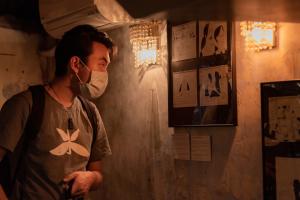Exhibition: Pollution, Data, Activism, 03.20.2021

This collection documents a talk and exhibiton about the Formosa Plastics Global Archive, held on March 20, 2021 at 柏林廢墟Tacheles in Taipei, Taiwan.
Photo Essay: Exhibition 03.20.2021
Photos from a talk and exhibiton about the Formosa Plastics Global Archive, held on March 20, 2021 at 柏林廢墟Tacheles in Taipei, Taiwan. All photos by Jiao Enguan 焦恩光.

Omar Pérez: Submarine Roots, Resisting (un)natural disasters
omarperezI am interested in seeing how social ties and networks have been used to cope with (un)natural disasters. My research focus on places under disasters conditions such as Puerto Rico after hurricane Maria, in which social ties have made the difference between life and death. Furthermore, “natural” disaster has been used to approved austerity measures and unjust policies to impoverished communities like in New Orleans after Katrina. These policies were not new, as they are rooted in structures of power to preserve the status quo. Yet, people have resisted, “through a network of branches, cultures, and geographies” that has stimulated a reflective process of looking within for solutions rather than outside. As often this outside solutions are not only detached from community’s reality but can perpetuate social injustices and inequalities.
McKittrick, K., & Woods, C. A. (Eds.). (2007). Black geographies and the politics of place. South End Press.
Bullard, R. D., & Wright, B. (Eds.). (2009). Race, place, and environmental justice after Hurricane Katrina: Struggles to reclaim, rebuild, and revitalize New Orleans and the Gulf Coast. Westview Press.
Environmental Justice framing implications in the EIS

The Environmental Impact Statement (EIS) is a document required by the National Environmental Policy Act
Annotated Bibliography (EIS)
This link complements the Essay Bibliography of the Project Environmental Justice framing implications in the EIS.
Environmental Justice Framing Implications in the EIS. Essay Bibliography
This is the PECE essay bibliography for:
EPA Database on EISs
This (EIS) database provides information about EISs provided by federal agencies, and EPA's comments concerning the EIS process.
pece_annotation_1473100023
harrison.leinweberDr. Schmid discusses emergency response to nuclear incidents, albeit at a very high level. She deals much more with the large scale factors involved in responding to an incident rather than the individual locality. She also addresses the importance of international NGOs in assisting locals after the first-responders have done what they can.

Translation of the event description into Mandarin.